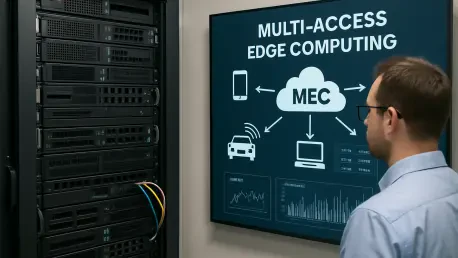The technology landscape is experiencing a seismic shift with the emergence of 5G and multi-access edge computing (MEC), offering unprecedented potential for the future development of intelligent industry. These advancements are not mere incremental improvements in telecommunications; they represent a revolutionary leap that is set to redefine the way industries operate. Promising faster speeds, ultra-low latency, and seamless connectivity, 5G technology is laying the groundwork for innovations across industries such as healthcare, energy, transportation, and manufacturing. MEC further strengthens this pillar by delivering processing power closer to the end-user, thus enhancing real-time decision-making. Companies like Capgemini are at the forefront, leveraging their expertise to assist businesses in navigating this transition toward Industry 4.0.
5G and MEC: Redefining Connectivity
Seamless Connectivity and Real-time Processing
5G technology is expected to radically change the connectivity landscape by ensuring seamless, high-speed data transmissions while significantly reducing latency. This transformation is pivotal as industries increasingly rely on connected devices and real-time data processing. Real-time communication facilitated by 5G can enable immediate data transfer from millions of IoT devices within sectors such as healthcare and manufacturing, thereby enhancing efficiency and productivity. The combination of 5G and MEC allows various data processing operations to occur closer to the source, reducing the time for data to travel through the network and enhancing the ability to make quick, informed decisions.
The integration of MEC has introduced a new paradigm where data analysis is performed at the edge of the network rather than relying on centralized cloud solutions. This architectural shift is crucial for applications that require real-time processing and low-latency interactions, such as autonomous vehicles, remote surgeries, and augmented reality. By reducing latency and enhancing processing capabilities, MEC supports intelligent systems to operate more efficiently, making it a cornerstone for industries aiming to enhance automation and introduce new technological capabilities. Furthermore, these advancements promise to revolutionize sectors by enabling new use cases that were previously constrained by technical limitations.
Innovating Across Diverse Industries
The potential impact of 5G and MEC is vast, with numerous industries standing to gain significant improvements in efficiency, innovation, and service delivery. In the transportation sector, for example, the integration of these technologies can support the development of connected and autonomous vehicles by facilitating real-time data exchange between vehicles, infrastructure, and external systems. This promises not only increased safety and efficiency but also the potential for entirely new modes of transportation and logistics solutions. Similarly, in healthcare, 5G’s capabilities could enable telemedicine applications providing instant access to medical experts and facilitating remote monitoring of patients, enhancing the delivery of care.
As industries explore the capabilities of 5G and MEC, the role of strategic partners becomes critical in ensuring successful integration and deployment. Organizations like Capgemini are deploying their industry experience to help companies adopt these technologies smoothly. With a track record of over 1,100 5G projects, Capgemini’s labs and comprehensive program management services provide a structured path for companies to innovate and optimize their operations with 5G and MEC technologies. These efforts ensure that technological advancements translate into tangible benefits and create new business opportunities.
Overcoming Integration Challenges
Addressing Telco Challenges
Telecommunications companies face a complex array of challenges as they work toward the integration and deployment of 5G and MEC technologies. High infrastructure costs, spectrum allocation, and regulatory constraints pose significant hurdles that need to be addressed to advance the widespread adoption of these technologies. Furthermore, multi-vendor integration issues add layers of complexity as companies must ensure seamless interoperability between various systems and networks. The effort to overcome these challenges requires substantial investments and strategic planning to create robust, flexible, and scalable networks capable of supporting future innovations.
Organizations such as Capgemini play a crucial role by acting as system integrators, assisting telecommunications companies in establishing advanced, cloud-based networks. Through their services, telecommunications companies can leverage cutting-edge automation solutions that reduce operational expenses, accelerate time-to-market, and enable faster upgrades. Adopting next-generation open connectivity frameworks also empowers telecom operators to increase network reliability, deploy scalable solutions, and optimize network-management processes, thereby positioning them as leaders in the technological landscape.
Enhancing Software Frameworks
A significant challenge faced by telecommunications companies lies in the integration of software frameworks, often creating scenarios of vendor lock-in that restrict flexibility and innovation. Overcoming these challenges is essential for companies seeking to adopt agile, adaptable solutions that evolve alongside industry demands. Capgemini facilitates this process by offering services designed to deliver faster time-to-market, improved agility, and greater innovation. With access to over 125 licensable building blocks, companies are able to co-create new technologies within domains like network management, enterprise resource planning, and customer experience.
Beyond technical support, organizations need to focus on creating innovative business models that maximize value from the adoption of these advanced technologies. Capgemini’s offerings extend beyond implementation, as they assist businesses in identifying opportunities to enhance revenue streams, drive efficiency, and improve customer perceptions. This holistic approach ensures that companies not only benefit from the technological advantages of 5G and MEC but actively shape their strategic direction, harnessing the full potential of an interconnected digital ecosystem.
The Rise of Private 5G Networks
Tailored Solutions for Industry Needs
The concept of private 5G networks has gained significant traction as industries recognize the value in adopting customized solutions designed to meet specific business requirements. Private 5G networks offer heightened reliability, uninterrupted uptime, and tailored features that address unique operational demands across sectors, from manufacturing to logistics. By offering dedicated resources, private 5G networks can provide enhanced security and better service quality, enabling industries to optimize their processes, reduce costs, and drive innovation. Additionally, these networks facilitate advanced applications within the Industrial Internet of Things (IIoT), allowing companies to leverage extensive data insights and improve operational decision-making.
Specialized expertise is a driving factor in the successful deployment of private 5G networks. Companies like Capgemini expedite this process by offering comprehensive guidance and support, assisting in areas such as architecture selection, cybersecurity, and provider selection. Experienced in cloud computing, enterprise resource planning, and artificial intelligence, these organizations help businesses optimize their operations and infrastructure. The result is a robust network architecture that delivers the flexibility and performance necessary to stay competitive and embrace the potential of emerging technology.
Enabling Enterprise Transformation
The adoption of private 5G networks marks a significant step in the transformation of enterprises, allowing them to reimagine their technological capabilities and strategic offerings. Companies embracing private 5G networks are better positioned to unlock operational efficiencies, elevate customer experiences, and enhance their competitive standing in the marketplace. These networks empower businesses to harness real-time data, enabling informed decision-making processes that drive product and service innovation. Additionally, private 5G networks provide redundancy and security features essential for industries operating in regulation-intensive environments, ensuring compliance with industry standards and safeguarding sensitive information.
As organizations navigate the complexities of transitioning to private 5G networks, collaboration with knowledgeable partners is crucial. Strategic support from solution providers like Capgemini enables enterprises to align their technological investments with long-term strategic goals, ensuring they harness the transformative power of 5G and MEC. These partnerships facilitate a seamless migration, allowing companies to fully capitalize on the benefits associated with private 5G implementations while maintaining focus on core business objectives.
Shaping the Future of Industry
5G technology promises to dramatically reshape the connectivity landscape by offering high-speed data transmissions with significantly reduced latency. As industries increasingly depend on connected devices and real-time data processing, the need for swift communication grows. 5G simplifies instant data transfer from numerous IoT devices in sectors such as healthcare and manufacturing, boosting efficiency and productivity. The combination with MEC lets data processing happen closer to the source, shortening the journey through the network and improving the ability to make quick, informed choices.
MEC shifts data analysis to the edge of the network, moving away from central cloud solutions. This change is key for applications needing real-time processing and low latency, like autonomous vehicles, remote surgeries, and augmented reality. By lowering latency and enhancing processing power, MEC helps intelligent systems operate more smoothly, making it essential for industries seeking to boost automation and adopt new tech capabilities. These advancements are poised to revolutionize sectors by enabling previously constrained applications.









